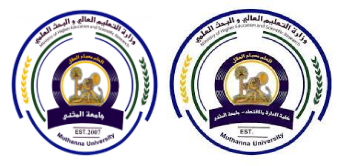دور القيادة الأخلاقية في بناء السمعة التنظيمية المدركة : دراسة تحليلية لأراء عينة من كليات جامعة القادسية
- Post by: Muthanna mjdes
- أغسطس 30, 2021
- Comments off
[vc_row][vc_column][vc_column_text]
الملخص
تناولت هذه الدراسة الدور الذي تمارسه القيادة الأخلاقية في بناء السمعة المنظمة ، إذ حاولت تقديم إطار نظري لبعض مما طرحه الكتاب والباحثين حول متغيري الدراسة ، إلى جانب إطار عملي تحليلي لآراء (38) من القيادات الجامعية في عينة من كليات جامعة القادسية . وقد تم التعبير عن القيادة الأخلاقية بوصفها متغيراً مستقلاً من خلال أبعادها الستة (العدالة , المشاركة في السلطة , وضوح الدور , الاهتمام بالعاملين , النزاهة , التوجيه الأخلاقي ) . في حين تم التعبير عن السمعة التنظيمية المدركة بعدَها متغيراً معتمداً من خلال مؤشراتها الأربعة ( الشعور حول المنظمة ، الإعجاب والاحترام ، الثقة ، السمعة الكلية ) . واعتمد الباحث الاستبانة كأداة رئيسية لقياس متغيرات الدراسة . حدد القسم الأول منها لقياس القيادة الأخلاقية بالاعتماد على مقياس (سيد ,عبد الباسط , وبشير 2017) . في حين حدد القسم الثاني لقياس السمعة التنظيمية المدركة بالاعتماد على المقياس الذي أعدَه كل من (Ponzi et al,2011; Reputation institute , 2012 ). وباستعمال مجموعة من الأدوات الإحصائية مثل معامل الارتباط البسيط لقياس علاقة الارتباط بين المتغيرين واختبار (t) لمعرفة معنوية هذه العلاقة ، وتحليل الانحدار المتعدد ، واختبار (f) لتحديد معنوية معادلة الانحدار، و (R²) لتفسير مقدار تأثير المتغير المستقل في المتغير المعتمد . فقد توصلت الدراسة إلى مجموعة من الاستنتاجات جاء في مقدمتها أن ممارسات القيادة الأخلاقية تلعب دوراً أساسياً في بناء سمعة المنظمات.
صباح حسين شناوة الزيادي *
معهد الصحة العالي في الديوانية
The role of ethical leadership in building perceived organizational reputation :An analytical study
Sabah . Hussein. Al zeyadi *a
Higher health institute in diwaniyah.
Abstract
This study discusses the role of ethical leadership in building perceived organizational reputation .It tries to introduce a theoretical framework about the variables according to the previous literature .It also introduces an analytical framework for the opinions of (38) educational leadership in a sample of faculties of AL-Qadisiya University . The ethical leadership as an independent variable was expressed through the six dimensions (Fairness ,power sharing , role clarification , attention workers , Integrity , ethical guidance ). While the expression for the perceived organizational reputation as dependent variable through four dimensions (Admire and respect, Trust, Good feeling, and Overall reputation). the researcher has adopted a questionnaire as tool to measure the variables of the study . The first section of which to measure ethical leadership based on the scale of (Syd,&Abd-Albasit,Bashir,2017). while the second section of which is devoted to measure perceived organizational reputation based on the scale of (Ponzi et al.,2011; Reputation institute , 2012) . the study used a set of statistical tools such as Pearson correlation coefficient , multiple regression analysis , F and ( R2) tests , The study found a set of conclusions and recommendations among which is the key role of ethical leadership practices in building good reputation for organization.
Key words: ethical leadership, perceived organizational reputation, clarity of role, ethical guidance, clarity of the role , ethical guidance , Qadisiyah University colleges.
………. تحميل الملف ……….[/vc_column_text][/vc_column][/vc_row]
